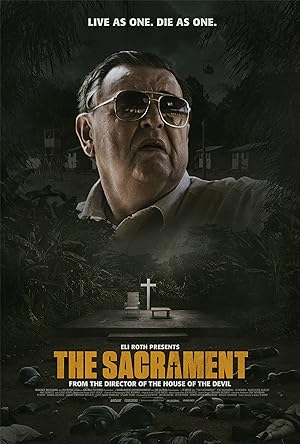The Sacrament is a seamless mashup of found footage and fake documentary genres. VICE decides to visit an employee’s sister in a different country at a religious commune. The ensuing visit closely mirrors how events unfolded in a similar historic scenario from the 1970s so depending on how familiar viewers are with that story, the movie may hold few surprises. I recognized the outline fairly early on, but am not so knowledgeable about the incident that I was comparing and contrasting fact with fiction.
I would not be surprised if a lot of viewers would be offended and view The Sacrament as exploitive of a real life tragedy. While I enjoyed the film, it relies heavily on religious cults are crazy tropes and rushes to the denouement instead of fully teasing out the early ambiguous moments that are simultaneously welcoming and sinister. I was transfixed because I theorize that any (black) Christian alive during and after the 1970s has asked his or herself whether the church that he or she was visiting seemed nice, but actually masked insanity that would not be revealed until it was too late. The bar is so low for a certain demographic that when a person shows even a modicum of respect and decency, welcomes you and recognizes your humanity, there is a fear that you will overlook a lot of warning flags.
The focal point of The Sacrament is the interview. For me, it is the real denouement, and the sensational moments that follow are perfunctory though jarring. I thought the power dynamic between the interviewer and interviewee was emblematic of how you can spot a manipulator. Notice which questions he does and does not answer. Really analyze how someone characterizes his or herself-are there specifics or general ideas that are used to make you relate to him or her. Spot how he decries certain facts as negative detractions while using negative rhetoric: outsiders, New York, the media, distinguishing people as different while pretending to be welcoming. Observe how a person uses a personal detail about you. Is it a weapon or a hug? Think about how much effort was devoted to getting that information. If someone asserts a fact about the community (“a place without violence”), but that is not your personal experience, do not doubt your experience because you momentarily feel assuaged. These are powerful lessons that we can use in real life when judging someone’s sincerity.
The Sacrament effectively shifted events to the twenty-first century and using a VICE team was a perfect way to frame the narrative. Normally innocuous moments are imbued with a certain sinister quality. There is an unspoken question about the responsibility of a journalist: measures to guarantee personal security, ethics of intervention, personal biases. The soundtrack has an almost unnoticeable heartbeat. When the siege mentality kicks in, suspension of disbelief begins to get strained, and some of the measures taken by those who are resisting seem outlandish, but what is terrifying is that many of the violent moments actually are rooted in reality. Any attempts at earlier personal portraits are scrubbed during the depictions of collective madness with uneven results. I tend to prefer fiction that doesn’t write off insanity as other, but are relatable if they are based in truth so we can learn lessons otherwise it reduces an otherwise nuanced beginning into a devolvement of the Eli Roth cataclysmic, unwitting tourist wandering into sadistic horror genre, which isn’t surprising since Roth was a producer.
The Sacrament is an uneven movie, but I did enjoy it and would recommend it, but it may offend your sensibilities since it is based on real life events. It did succeed in renewing my interest in delving back into the historical accounts.
Stay In The Know
Join my mailing list to get updates about recent reviews, upcoming speaking engagements, and film news.





